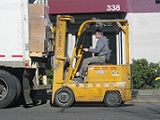Worker Injured in Forklift Accident Fired, Sues for Retaliation
Post Views 3A material handler at Exide Technologies was fired for “flagrant disregard of safety rules and practices.” At the time, the employee was on medical leave for a work-related injury. The man reacted with a lawsuit, alleging retaliation and FMLA (Family and Medical Leave Act) violations.
In 2007, the man, an eight-year employee at Exide, was operating a forklift to transport batteries. He complained to his supervisor of low lighting in the plant that day, and later, on his tenth trip through the plant, the pallet holding the batteries struck a pole. Batteries fell and spilled acid, and the man’s head, back and neck were injured. His supervisor took him to the hospital, and he was placed on FMLA leave for ten days.
The HR manager reviewed the incident report regarding the accident. The employee’s file included three written warnings between 2000 and 2003 for careless material handling, unauthorized use of machinery and an unspecified health and safety policy violation. There was an additional citation for running a forklift into a pole in 2006. One month prior to his termination, the plaintiff had received a “Performance Expectations” memo, noting a need for improvement in relation to safety. The HR manager recommended termination, and the man was fired four days after the accident.
The lawsuit indicated four charges: retaliation for exercising his workers’ compensation rights; FMLA retaliation; FMLA failure to restore; and FMLA interference. A district court granted summary judgment in favor of Exide Technologies. On appeal, the plaintiff attempted to prove pretext for his termination by citing four points: the company had not followed each step of its disciplinary policy; the man was “forced” to work in “dangerous conditions” with dim lighting in the plant; the forklift accident was “minor”; and a bystander who saw nothing “unsafe or improper.”

Because the plaintiff could not prove a pretextual reason for his firing, the FMLA interference claim was similarly unsupported. The evidence, in other words, seemed to show that the plaintiff would have been terminated in spite of his FMLA leave. The failure to restore claim, essentially a more specific version of interference, and the state law claim of retaliation were dismissed for the same reason: the plaintiff’s inability to provide sufficient evidence of pretext. The district court’s decision was affirmed.
Worker Injured in Forklift Accident Fired, Sues for Retaliation by Harrison Barnes



 Top 4 Most Effective Management Styles & How to Use Them
Top 4 Most Effective Management Styles & How to Use Them  Want to Be a Great Leader? Learn to Listen
Want to Be a Great Leader? Learn to Listen  Want to Attract Top Talent to Your Company? Have a Purpose
Want to Attract Top Talent to Your Company? Have a Purpose  5 Ways You Can Hire and Keep the Best Employees for Your Company
5 Ways You Can Hire and Keep the Best Employees for Your Company  The New Trend of Defamation Lawsuits
The New Trend of Defamation Lawsuits  Top 10 Most Popular Granted Employer Articles of 2017
Top 10 Most Popular Granted Employer Articles of 2017